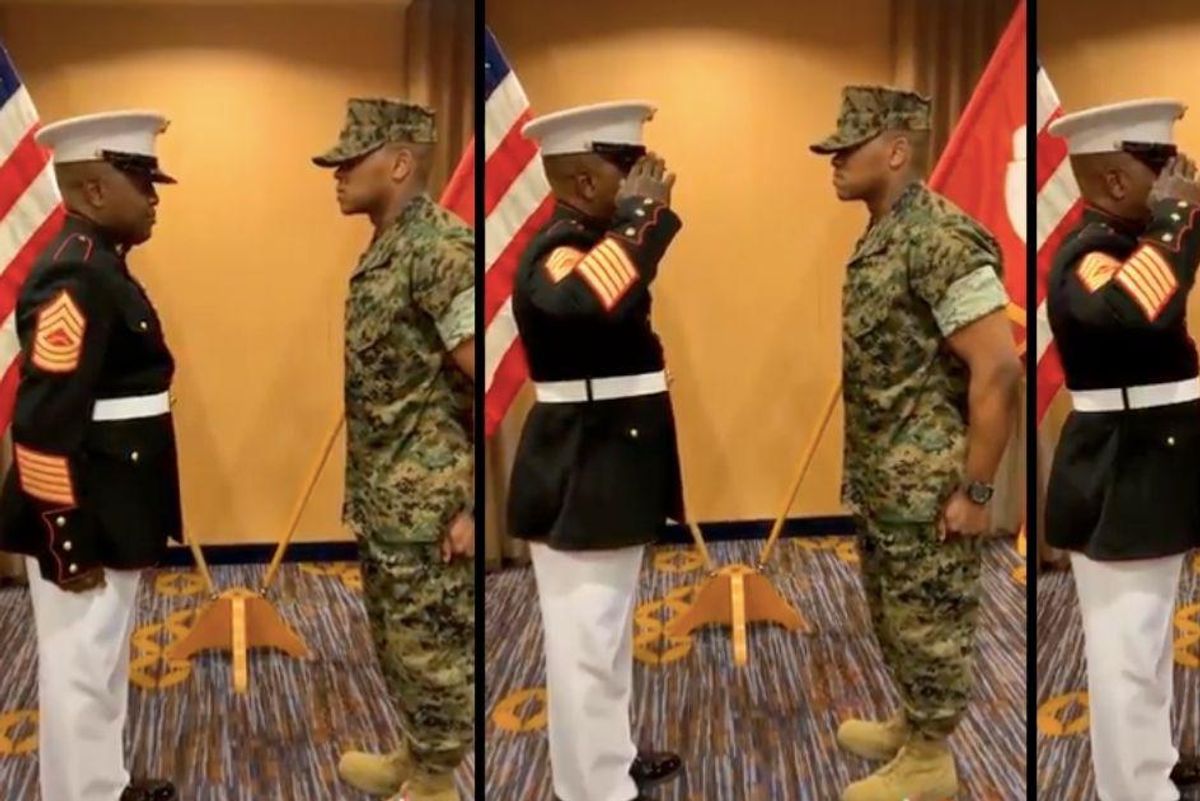Marine Corps Master Sergeant gave his son an emotional first salute as a commissioned officer
There are moments as a parent that stand out, and there are moments as a human that stand out, and when those two realities converge, it makes for pure magic.
One such magical moment was captured and shared on TikTok and has been viewed by millions in just one day.
Master Sergeant Michael Fisher is an instructor with the Marine Corps Junior ROTC program. He has spent the past nine months sharing sweet videos on Tik Tok of himself and his adorable 1-year-old granddaughter, Abby, but yesterday he shared something completely different. In his official role as Master Sergeant, Fisher gave his son his first salute as a Second Lieutenant.
And as he explained the pride he felt, the emotion in his voice took us straight to his heart.
"I've watched you grow and mature and become the man that you are today," he said. "You have always been respectful, by saying 'Yes sir.' 'No sir.' 'Yes, ma'am.' And 'No, ma'am.' A salute is a sign of respect. It is a privilege to render you your first salute."
He raised his hand in salute, then added, his voice cracking, "But it is a greater honor to say 'Congratulations, sir, on your commissioning.'"
@e8msgt Rendering my son his 1st Salute! #marine #2ndLT #usmc #fatherson #fyp #military #instructor
The moment was clearly significant for this father and son for personal reasons, but it was also significant that it took place between a Black officer and non-commissioned officer.
Though racial diversity is fairly representative of the general population in lower officer ranks of the military, the upper ranks are lacking in such diversity. In fact, the higher in pay grade you go, the more white the demographics become.
As this chart from the Defense Department shows, at the top of the pay grade for active enlistment officers, 92% are white and 5% are Black.
For the reserves, the trend is similar, with white officers making up a disproportionate percentage of the top pay grades.
As Master Sergeant, Michael Fisher is an upper-ranked non-commissioned officer. His son's rank of Second Lieutenant is the first commissioned officer ranking. (This site has a breakdown of how the rankings work, and what the letters below the bars on the chart mean.)
The Defense Department's own report acknowledges that racial minorities are underrepresented in both senior non-commissioned officer ranks and as well as higher commissioned officer ranks. The report also explains why that's a problem:
"Appropriate representation of minorities in military leadership positions is increasingly important in the context of the nation's demographic trends. The non-Hispanic White population is expected to decline from 199 million in 2020 to 179 million in 2060, while the rest of the U.S. population continues to grow. The population of people who are two or more races is projected to be the single fastest-growing racial or ethnic group, followed by Asian and Hispanic Americans. Thus, if military leaders are to mirror the racial and ethnic composition of the Service members they lead and the American public they serve, DoD must ensure that all Service members have access to opportunities to succeed and advance into leadership positions."
Here's hoping this new Second Lieutenant will have every opportunity to rise in the officer ranks, if he so chooses.
Meanwhile, we'll watch this video a few more times and just for the feels. There's something about someone in uniform in a formal situation trying to hold it together that just tugs at the heartstrings every time. And seeing this career military man honoring his son with his first salute as an officer—and hearing his voice break as he does so—it's just so touching.
Thank you, Master Sergeant Fisher and Second Lieutenant son, for your dutiful service.



